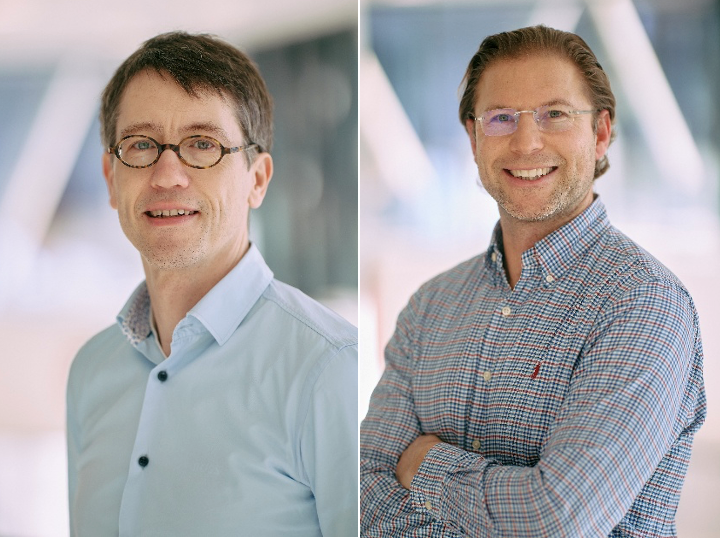Synergy Grant from the European Research Council for an Application-Oriented Project in Medicine

Success with a Synergy Grant: The Tübingen researchers Thorsten Stafforst (left) and M3 Scientific Director Mathias Heikenwälder (right).
Liver diseases are on the rise worldwide. A research team led by Professor Thorsten Stafforst and Professor Mathias Heikenwälder from the Cluster of Excellence “Image-guided and Functionally Instructed Tumor Therapies” (iFIT) at the University of Tübingen, together with Professor Erez Levanon from Bar-Ilan University in Israel, aims to expand the currently insufficient therapeutic options in their new project “HepaModulatoR.” Using RNA editing, a genetic engineering method, they intend to develop precise, safe, and personalized therapies against fatty liver disease, inflammation, and liver cancer.
For this purpose, they have obtained a Synergy Grant from the European Research Council (ERC), which provides project funding of ten million euros over a period of six years.
With the Synergy Grants, the European Research Council funds collaborative projects which, due to their complexity, are conducted by several researchers and their groups in order to achieve breakthroughs that could not be reached in individual projects.
Reversible alteration of genetic information
The liver is considered the metabolic center of the body and possesses the ability to regenerate itself. However, when it becomes unbalanced, the consequences are devastating: millions of people worldwide suffer from fatty liver, viral infections, or other chronic damage that can lead to liver cancer. Liver cancer is currently the fourth most frequent cause of cancer death—and the chances of recovery are still low.
In the HepaModulatoR project, the research team aims to tackle liver diseases at their molecular roots using the most modern RNA technologies. While so-called gene scissors permanently alter DNA, the stable carrier of genetic information, RNA editing uses a gentler approach. The genetic information in DNA is regularly transcribed into the intermediate molecule RNA within the cell, which then serves as a template for protein production. The modification of RNA in corrective editing, however, remains temporary.
“We want to help liver cells help themselves,” says Mathias Heikenwälder, Scientific Director at the M3 Research Center of the Medical Faculty of Tübingen and a recognized expert on liver inflammation. “If we can control disease processes early and precisely, we create completely new possibilities for the treatment of chronic liver diseases.”
Thorsten Stafforst from the Institute of Biochemistry at the University of Tübingen and founding member of the Tübingen Center for Gene and RNA Therapy, emphasizes:
“Our vision is to develop RNA drugs that can flexibly adapt to different stages of disease. We combine molecular precision with clinical applicability—this is unique in Europe.”
The Tübingen researchers and Erez Levanon are working toward the common goal of developing new RNA medicines that reprogram liver cells in different stages of disease—from disturbed metabolism to tumor growth.
Three approaches against liver diseases
The research team is pursuing three main focuses. In the early phase, liver metabolism is to be stabilized so that fats and sugars do not accumulate in a harmful way. In intermediate stages, the aim is to slow down chronic inflammation in order to protect liver tissue, and in late stages, when cancer develops, the immune system is to be activated to specifically destroy tumor cells.
This combination of prevention, regulation, and immune activation could open up completely new therapeutic pathways—especially for patients for whom conventional treatments fail.
Cutting-edge research from Tübingen
The iFIT Cluster of Excellence, to which both Tübingen researchers belong, is Germany’s only oncology-focused Cluster of Excellence devoted entirely to cancer research. This environment offers outstanding infrastructure and promotes close cooperation between different disciplines.
Heikenwälder’s laboratory contributes decades of experience with models of liver inflammation and cancer, while Stafforst’s team is regarded internationally as a pioneer in RNA editing. He has also founded the biotech start-up AIRNA, in which RNA editing methods are being translated into clinical application. Together, Stafforst and Heikenwälder combine their expertise to precisely modulate liver metabolism and the immune system in different stages of disease.
In the long term, the HepaModulatoR project aims, beyond its concrete research on liver diseases, to demonstrate that RNA-based medicine can serve as a tool for many diseases—safe, flexible, and tailored to the individual.
“We are only at the beginning,” says Heikenwälder. “But if we can understand how to correctly interpret and modify the language of cells at the RNA level, then this is nothing less than a paradigm shift in medicine.”
Based on a press release by the University Hospital Tübingen / JE, University Communications
Further information:
The project “Modulation of Liver Metabolism/Inflammation at Different Disease Stages by Leveraging ADAR-based RNA Editing” (HepaModulatoR) will be funded by a Synergy Grant of the European Research Council from 2026 to 2032 with approximately ten million euros.
